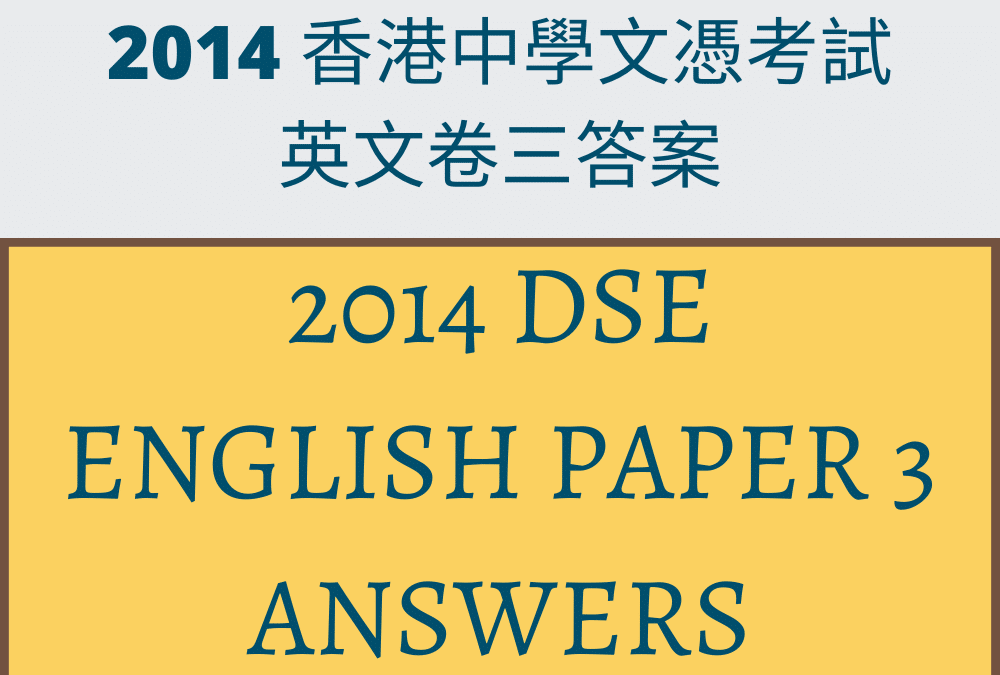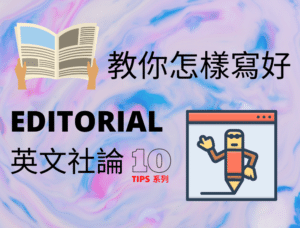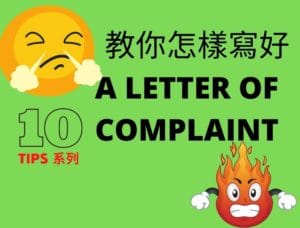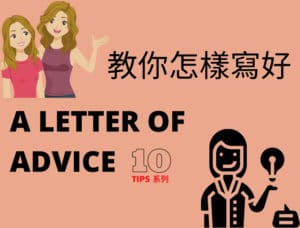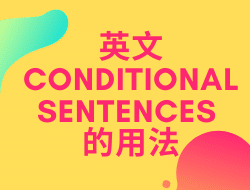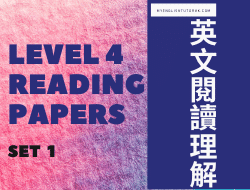Please enrol ‘2014 DSE English Paper 3′ to download the materials.
2014 DSE English Paper 3 答案: TASK 6
Amendments to your advertisement
Dear Mr Ross,
I am writing regarding(1) the advertisement that you would like published in the next issue of Asia Life. We would be happy to publish it, but would you be able to make some changes first?(2)
The first thing we’d like(3) you to do is reduce the number of words. We advise that you don’t use more than 70 words, as the advertisement should take up no more than half a page in our magazine. We would also like to suggest that you consider(4) replacing the current picture of a businessman and woman with an image of the hotel rooms themselves.
Additionally,(5) we would be grateful if you could(6) let readers know your business address and the room prices, as well as provide them with a website address or company registration number.
If you could make these changes and get the revised advert back to me by 30 April at the latest, I would be much obliged(7). Once accepted, we kindly request that you provide payment for 50% of the fees one week before the magazine goes to press(8).
Kind regards,
Marty Poon
2014 DSE English Paper 3 Task 6 Explanations:
(1) ‘I am writing regarding’ = I am writing about / I am writing concerning / I am writing regarding
(2) Keep the tone polite. Don’t make demands. Your reader knows it is a demand, but you should make it more politely.
(3) Use ‘would’ to make it more polite. You need to reduce the number of words.
(4) Again, don’t make demands. Make suggestions. We want you to change the picture.
(5) Use ‘additionally’ to connect unrelated points.
(6) Use ‘would’ and ‘could’ to create a polite tone.
(7) ‘I would be very much obliged’ = I would be very grateful.
(8) ‘go to press’ = be published.
2014 DSE English Paper 3 答案: TASK 7
Off the Beaten Track(1)
It seems that tourists nowadays are looking for exotic journey’s they’ll never forget. Here are three destinations for intrepid travellers!(2)
If you fancy(3) staying in a natural environment, why not try a night in a Norwegian ice hotel?(4) Staying in a hotel made of ice might sound like a chilling prospect,(5) but an ice hotel is not cold and warm clothes are provided. The only drawback(6) is that the hotel is only open in winter – for obvious reasons!
Or if you’re after something(8) a bit more cosy, why not try a stay inside(7)—inside a prison, that is! The Aussies(9) got there first on this idea, allowing visitors to sleep soundly in their own four-star cell. Don’t worry, keys are provided and inmates(10)—oops, hotel guests—cook dinner communally, so it’s not as lonely as it sounds.
Or perhaps you prefer life at sea. If so, then a stay on the lighthouse of Lochinver, Scotland might be for you. The rooms are round and allow you to glimpse the tranquil and breathtaking scenery.(11) It’s a great choice for all the birdwatchers out there.
So whatever you’re after, make sure your next holiday is one you’ll never forget! (12)
2014 DSE English Paper 3 Task 7 Explanations:
(1) Use a title. ‘Off the beaten track’ ≈ something/somewhere unusual.
(2) Add a short introduction that sets the general context. Don’t jump straight in with your points. ‘Intrepid’ = adventurous.
(3) ‘fancy’ + gerund = want (informal). Do you fancy going for coffee? = Do you want to go for coffee?
(4) Use rhetorical questions to get your reader interested.
(5) A pun. ‘Chilling’ has two meanings: a) very cold; b) scary.
(6) ‘drawback’ = disadvantage.
(7) ‘inside’ = in prison. He was inside for twenty years before they released him = He was in prison for twenty years before they released him.
(8) ‘to be after something’ = to want/desire something (informal). Tom joined the dating site because he was after a girlfriend = because he wanted a girlfriend.
(9) ‘Aussies’, pronounced /ɒziz/ = Australians (informal). Use some informal language in feature articles. The style overall should be semi-formal.
(10) ‘inmates’ = prisoners
(11) Don’t rely on boring vocabulary such as ‘beautiful’. Use synonyms.
(12) End with a short, memorable closing line.
2014 DSE English Paper 3 答案: TASK 8
Hong Kong Tourism: The Way It Was(1)
Nowadays we take it for granted(2) that we can book holidays at the click of a button, or be half way around the world in less than a day. But it wasn’t always like this.(3)
A century ago, tourists had to travel to Hong Kong by ship of train or both, and the journey across the oceans could take up to six weeks. Once tourists did arrive, the accommodation they found was quite different from today(4): in the 1920s, the famous Dragon Hotel still had stables for horses. These(5) were used for transport, along with popular rickshaws.
Of course, such travel tended to be the preserve (6) of the rich. Wealthy(7) tourists travelled with servants who were charged with carrying vast amounts(8) of luggage for their masters. Needless to say, opportunities to travel abroad did not come cheap. Rooms at the Dragon were twice as expensive in real terms in the 1920s than they are today.
Another thing that was different was entertainment.(9) In the past, after-dinner dances and tiger hunts were popular ways of passing time in the evening.
So what do you think: have things changed for the better or the worse since then? (10)
2014 DSE English Paper 3 Task 8 Explanations:
(1) Give your article a title.
(2) ‘take something for granted’ = to expect something always to be there and not to think about life without it. Before I became blind, I always took my sight for granted. Now I realise just how precious sight is.
(3) Vary sentence structure. Use some short sentences.
(4) Remember the article is supposed to compare present and past conditions. Don’t forget to refer to the present briefly.
(5) Use ‘these’ or ‘those’ to link sentences together and to avoid overreliance on relative pronouns.
(6) ‘be the preserve of’ = to be restricted to. University should not be the preserve of the rich. It should be open to everyone.
(7) Use synonyms instead of repeating ‘rich’.
(8) ‘vast amounts’ = lots of
(9) Don’t rely on paragraph-beginning connectors such as ‘moreover’, ‘furthermore’ and ‘on the other hand’. You can connect paragraphs together by using a full sentence, as here.
(10) End with a rhetorical question to engage your reader’s interest.
2014 DSE English Paper 3 答案: TASK 9
To: Queenie Lau
Subject: Amendments to your article
Dear Ms Lau,
I’m writing regarding your article about plastic surgery holidays in Thailand which we would be happy to publish subject to(1) a few amendments.
We’d first (2) like to check that you have copyright on the images you’re using and if not, please be sure to source the images, of which we need 15-20. From these, our team will select about five to include in the publication. Please send them as high resolution JPEG files.
Regarding the text itself, we would like to remind you(3) that we are unable to publish texts of more than 900 words. If you’d be able to cut it down for us, that would be great. Additionally, we’d appreciate it(4) if you could provide a title of no more than 80 characters.
The only other concern we had was(5) about Thai place names. Please double check for these for us to avoid any embarrassment. Once you’ve done that, and checked all other information, we’d be delighted(6) to accept your resubmission no later than 30 April.
I look forward to receiving your resubmission.(7)
Best wishes,
Marty Poon.
2014 DSE English Paper 3 Task 9 Explanations:
(1) ‘subject to’ ≈ if sb. allows / if you do / if smth. happens. You can go on holiday subject to sufficient funds being in your account = You can go on holiday if you have enough funds in your account.
(2) Don’t rely on connectors like ‘firstly’/‘secondly’/‘thirdly’. You can build these connecting phrases into the sentence itself.
(3) Use polite phrases such as ‘we’d like to remind you’ to sound polite. You need to reduce the number of words / We won’t publish your article unless you make it shorter.
(4) Another polite phrase. = We’d be grateful if…
(5) Use full sentences to connect paragraphs together instead of overusing paragraph-beginning connectors such as ‘moreover’ or ‘nevertheless’.
(6) Sound enthusiastic about her submission. Remember, you are not her boss. Don’t demand things from her. She is doing something for you.
(7) Add a polite closing line.
2014 DSE English Paper 3 答案: TASK 10
Whose world is it anyway?(1)
A recent letter to Asia Life claimed that the effects of tourism are primarily negative and the writer applauded the efforts of(2) the Brazilian government to restrict tourist access to some of the country’s more remote spots. Is he right or might there be more advantages to tourism than meets the eye?(3)
To begin with, tourism has one very significant advantage: money. Money doesn’t have to be a dirty word(4). It buys clean water, helps to develop infrastructure, roads and hospitals. It even pays for education and creates job opportunities. Without this much-needed(5) injection of cash, national economies would collapse.
The benefits do not stop there, however.(6) For example, tourists can help people learn English, which is a vital skill in the globalized world. Moreover, tourists can have a lasting positive impact on(7) the local culture. One such example of this is a village in the village of Sauri in Kenya, where a young tourist helped the villagers to develop a website with lots of information and ideas about the local culture.(8)
Indeed, keeping traditions alive is an argument for tourism, not against it. For instance, the traditional Thai Nora dance was on the verge of extinction (9) before its popularity was revived by tourist interest. Tourists can take these impressions home with them and publish their stories to inform others of their experience.
So yes, let’s be cautious, but let’s not tar all tourists with the same brush.(10) They’re not all bad.
2014 DSE English Paper 3 Task 10 Explanations:
(1) Create an eye-catching title.
(2) ‘to applaud the efforts of someone’ = to say good things about smth sb has done.
(3) Use a rhetorical question to grab interest. ‘More than meets the eye’ = more than you can see at first. The exam looked easy, but some of the questions were more difficult that first meets the eye.
(4) ‘dirty word’ = a word with bad associations
(5) ‘much-needed’ (adj.) = important. After working for three weeks without a break, I was able to take a much-needed holiday.
(6) Connect paragraphs together with a phrase like this.
(7) ‘have a lasting impact on smth’ = have long-term consequences for smth.
(8) Briefly summarise what happened. You don’t need to give lots and lots of detail.
(9) ‘to be on the verge of extinction’ = to have almost died out. The giant panda is on the verge of extinction.
(10) ‘to tar everyone with the same brush’ = to apply the same treatment to everyone. Most of the Johnson family were criminals, but we shouldn’t tar them all with the same brush, because their son Jimmy is really nice.
